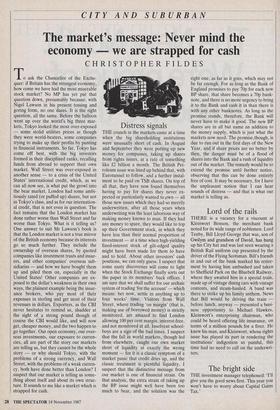Distress signals
THE crunch in the markets came at a time when the big shareholding institutions were unusually short of cash. In August and September they were putting up new money for companies, taking up shares from rights issues, at a rate of something like £2 billion a month. The British Pet- roleum issue was lined up behind that, with Eurotunnel to follow, and a further instal- ment to be paid on TSB shares. On top of all that, they have now found themselves having to pay for shares they never ex- pected or particularly wanted to .own — all those new issues which they had so merrily underwritten, after all those years when underwriting was the least laborious way of making money known to man. If they had any money to spare, they would like to top up their Government stock, in which they have less than their normal proportion of investment — at a time when high-yielding fixed-interest stock of gilt-edged quality might have been made for them to have and to hold. About other investors' cash positions, we can only guess. I suspect that some nasty discoveries will come to light when the Stock Exchange finally sorts out the paper in its members' back offices. I am sure that we shall suffer for our archaic system of trading 'for the account' — which means: bet now, settle in anything up to four weeks' time. Visitors from Wall Street, where trading 'on margin' (that is, making use of borrowed money) is strictly monitored, are amazed to find London allowing 100 per cent margin, interest-free, and not monitored at all. Insolvent school- boys are a sign of the bad times. I suspect that the fall in world markets, though led from elsewhere, caught our own market short of liquidity at exactly the wrong moment — for it is a classic symptom of a market panic that credit dries up, and the classic treatment is plentiful liquidity. I suspect that the distinctive message from our market is one of financial strain. On that analysis, the extra strain of taking up the BP issue might well have been too much to bear, and the solution was the right one, as far as it goes, which may not be far enough. For as long as the Bank of England promises to pay 70p for each new BP share, that share becomes a 70p bank- note, and there is no more urgency to bring it to the Bank and cash it in than there is with any other banknotes. As long as the promise stands, therefore, the Bank will never have to make it good. The new BP shares are in all but name an addition to the money supply, which is just what the markets now need. The promise,though, is due to run out in the first days of the New Year, and if share prices are no better by then, the danger must be of a flood of shares into the Bank and a rush of liquidity out of the market. The remedy would be to extend the promise until further notice, observing that this can be done entirely free of cost. It may be necessary, for I have the unpleasant notion that I can hear sounds of distress — and that is what our market is telling us.










































































 Previous page
Previous page